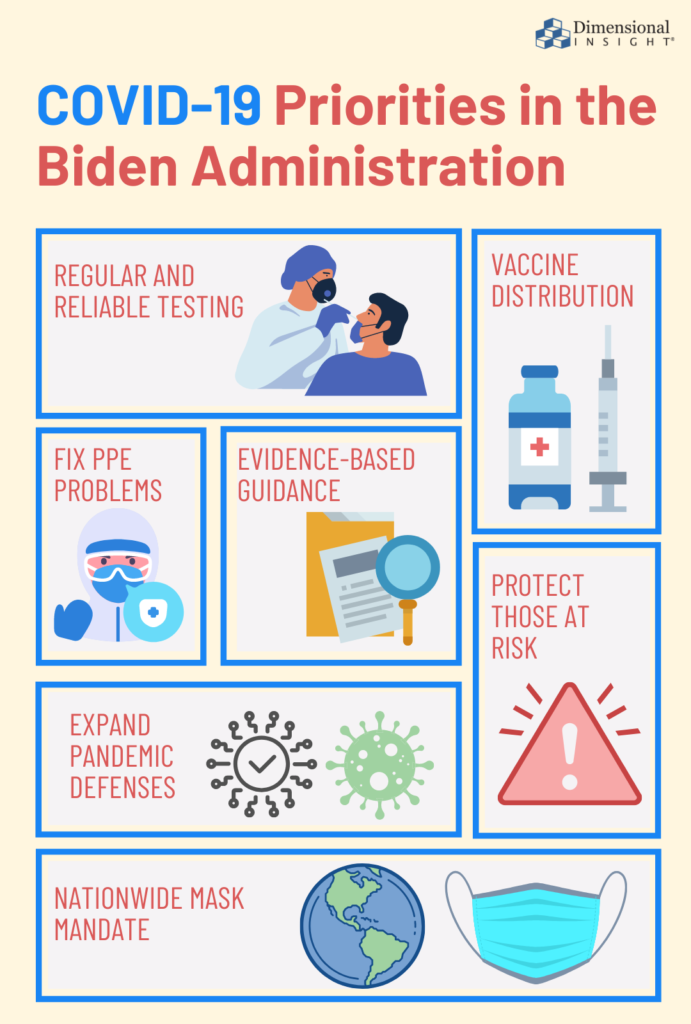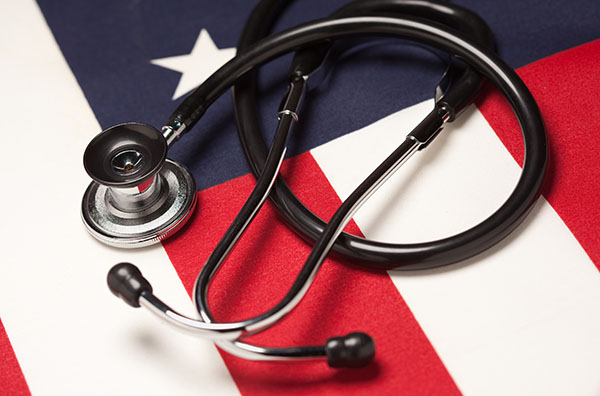Now that the 2020 election has taken place and President-elect Joe Biden prepares to take office in January, all eyes are on what policy changes will take place in 2021.
Healthcare is one of the biggest areas that will be affected by the change of guard in the Oval Office, from issues such as the COVID-19 pandemic to the status of the Affordable Care Act (ACA). Let’s examine some of the top healthcare issues that could be impacted by the new Biden administration.
COVID-19 pandemic
President-elect Biden has vowed to have a more national response to the COVID-19 pandemic instead of a state-driven response. The Biden-Harris team has released its seven-point plan to beat COVID-19, which includes:
- Access to free testing: This includes doubling the number of drive-through testing sites and investing in home tests or instant tests.
- Fix personal protective equipment (PPE) problems: This means ramping up production of masks, face shields, and other PPE to build up the national stockpile so supply exceeds demand.
- Provide clear, consistent, evidence-based guidance on navigating the pandemic: This would help provide resources for schools, small businesses, and families to navigate the crisis, including funding to help schools and businesses equip themselves to adapt to the pandemic. It would also provide specific guidance by the CDC on when to open or close parts of the economy based on the level of risk or degree of viral spread in a community.
- Effective, equitable distribution of treatments and vaccines: The Biden-Harris administration says it will invest $25 billion in vaccine manufacturing and distribution so all Americans can be vaccinated for free. The team also says it will rely on career scientists to be in charge of all safety and efficacy decisions.
- Protect older and at-risk Americans: The administration is planning to establish a COVID-19 Racial and Ethnic Disparities Task Force to look at how social determinants of health played a role in who was impacted by the pandemic. It is also creating the Nationwide Pandemic Dashboard so people can see the status of local transmission in their ZIP codes.
- Predict, prevent and mitigate pandemic threats: This would restore the U.S.’s relationship with the World Health Organization (WHO), as well as restore the pandemic response team and expand the number of the CDC’s deployed disease detectives overseas.
- Implement mask mandates nationwide: President-elect Biden plans to work with governors to implement mandatory mask wearing when people are around others outside of their households.

Affordable Care Act
During the Trump administration, there were several efforts to chip away at the ACA, and the future of the act now is in the hands of the Supreme Court with the case California v. Texas. While the new Biden administration can’t control the fate of how the court will decide, early indications are that the Supreme Court will not overturn the ACA, but will sever the individual mandate from the law.
While it will be hard for Democrats to pass any new major legislation to strengthen the ACA – given that either the Republicans will control the Senate or there will be a divided chamber come January – there are some executive actions President-elect Biden could take to reverse some of President Trump’s attempts to dismantle the ACA. This includes having a special enrollment period for 2021 since the Trump administration discontinued marketing to let people know about the open enrollment period.
Drug pricing
One issue that has bipartisan support is reducing prescription drug prices. In fact, President Trump recently finalized a drug-pricing rule that would set the price Medicare pays for drugs on the lowest price paid in other developed countries.
While many believe this rule might be struck down in court, some say this action might make it easier for President-elect Biden to reach an agreement on prices with the pharmaceutical industry.
Surprise billing
Surprise billing is when a patient receives a hospital bill from the emergency room, out-of-network provider, or independent providers inside a hospital that amount to much more money than the patient expected to pay. According to a study, 18% of all emergency visits and 16% of in-network hospital stays have had at least one out-of-network charge billed to patients.
Both Democrats and Republicans have voiced support for legislation to curb surprise billing. Last year, legislation almost passed, and experts believe when President-elect Biden takes office, it’s likely Congress will try to push through a bill to help reduce surprise billing, and as a result, lower overall healthcare costs.
Conclusion
With the new Biden-Harris administration, the COVID-19 pandemic will obviously take the highest priority in terms of resources and focus. But there are other areas of healthcare that will likely be impacted once the President-elect takes office. Watch for moves in the next four years that will aim to strengthen the ACA and reduce costs across the healthcare system.
For more information, read our white paper: Staying One Step Ahead of COVID-19 Using a Data-Driven Response
- Solving Hospital CEOs’ Pressing Challenges With Analytics - April 15, 2024
- Navigating the Wellness Wave: Wine & Spirits Data Strategy - April 9, 2024
- Takeaways from HIMSS24 - March 26, 2024



